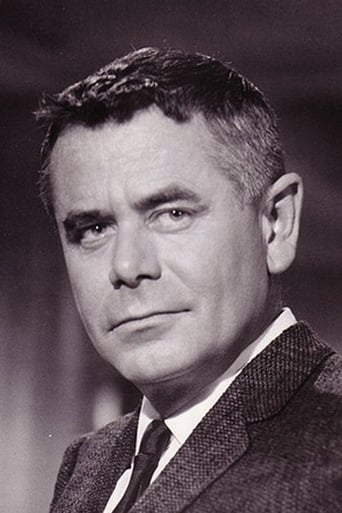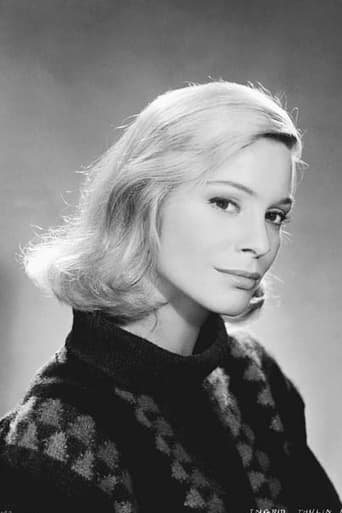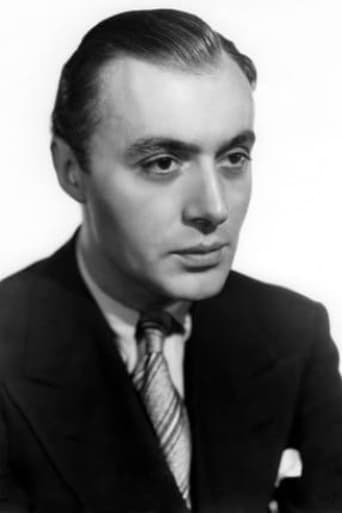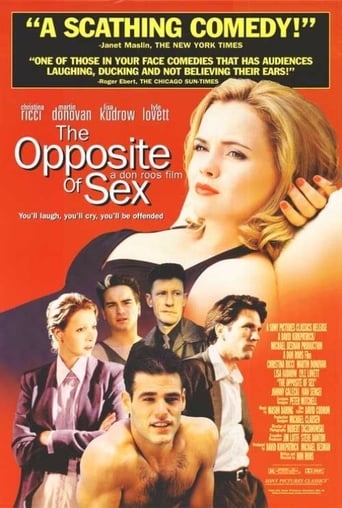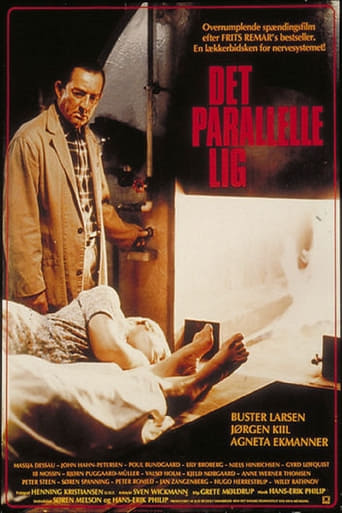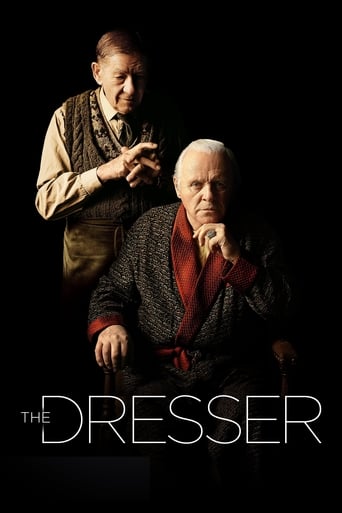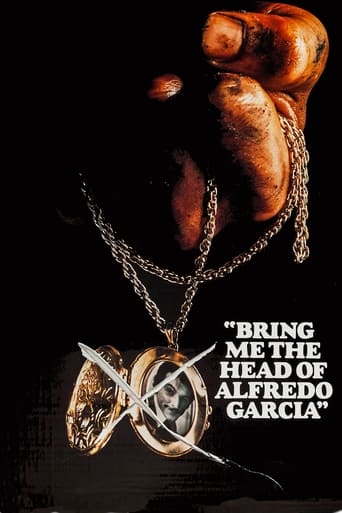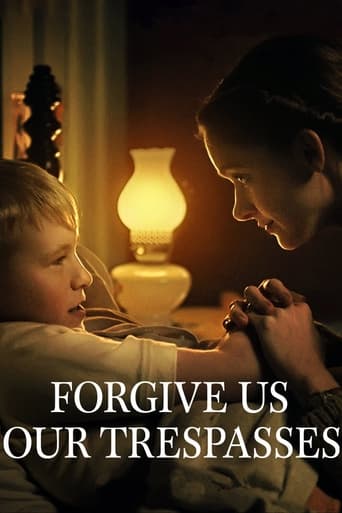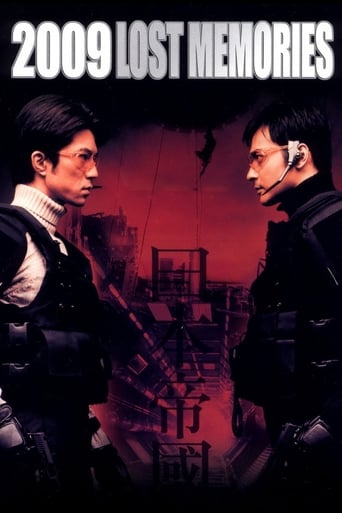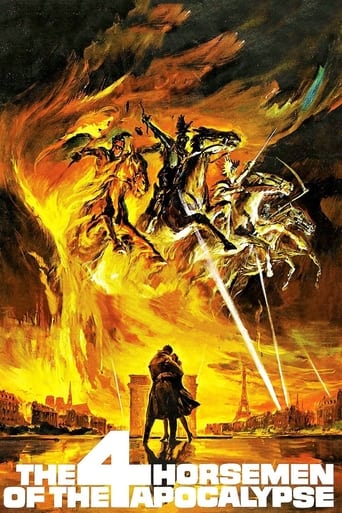
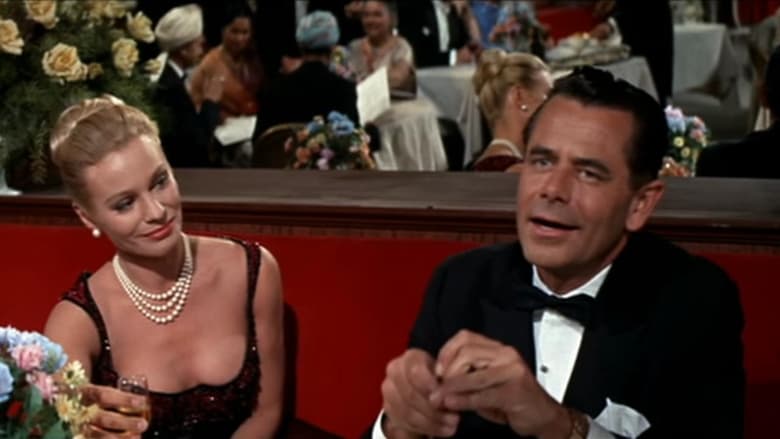
The Four Horsemen of the Apocalypse (1962)
Karl from Germany and Marcelo from France emigrated to Argentina and became brothers-in-law. Karl soon returned to Germany to serve in the army. Marcelo and his children Julio and Chichi became Argentinean citizens but later returned to Paris. Karl became a general with a son (Heinrich) in the SS and in WWII he got a high job within the occupation administration in France.
Watch Trailer
Cast
Similar titles
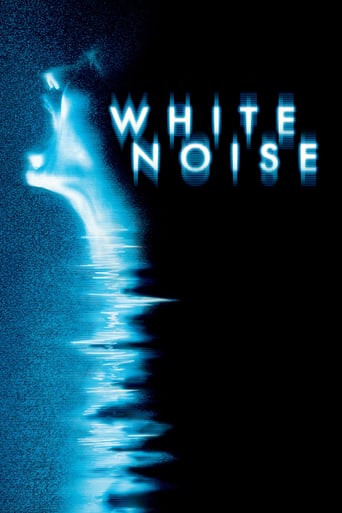

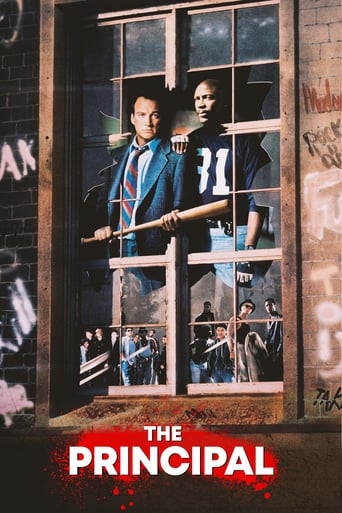
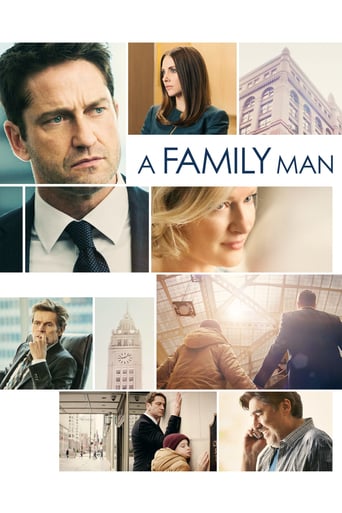
Reviews
Very best movie i ever watch
Really Surprised!
One of my all time favorites.
Exactly the movie you think it is, but not the movie you want it to be.
When this movie came out in 1962, I was in training for the U.S. Army. From April 1962 to Oct 1964, I served near Mainz, Germany, with the American airborne portion of the 8th Infantry Division (504, 505 and 509 Airborne units). I first saw this film sometime during 1962. That was during the Cold War – before Vietnam, and right after the Berlin Wall went up. Besides it being a World War II drama film with some action, it made an impression on me at that young age. It was about fighting against an oppressor and aggressor, and a story about a family divided by the war. There I was in Europe, where WWII had concluded just 17 years before. I was serving to defend a divided Germany where it's eastern half and the rest of Eastern Europe were held captive by the Soviet Union. We held maneuvers and trained along the Czech and East German borders. We had exercises with other NATO countries – British, West German and others. We jumped in Germany, Denmark and Turkey. While I was serving my country and a just cause – and was willing to die for both, deep inside I was like most other American patriots of the day. I hoped that I would never have to see battle. I hoped I would never be face- to-face with an enemy soldier when I had to either shoot to kill or be killed. I have since watched "The Four Horsemen of the Apocalypse" three or four more times. Each time I saw a little something else in the film. Most obvious, of course, is the tragedy of war and destruction of a family. With this most recent viewing of the film, another aspect emerged. I think it was always there, but now it loomed large. That was that good people cannot run away or isolate themselves from a world war. Or any abomination or injustice of such a nature. By its scope, it involves the whole world. Maybe not in the direct combat, but it affects the whole of humanity.In this film, the family patriarch, Julio Madariaga, had tried to do just that – isolate his family from war. By leaving his native Spain for Argentina three decades or more earlier, he hoped to raise a family that could hide from the evils of war. Indeed, what father would not want his family to be safe and away from war? But, in striving thus, Madariaga secluded his family from the world and what was going on in it. Had he not done so, his daughters, their husbands and children would likely have grown up better informed and more closely aligned as a family. By paying attention to events taking shape in Europe, they would have known more about Adolf Hitler and the Nazi threat to peace. By watching many years ahead of the Third Reich and the war, and discussing and looking closely at the events in Europe, the family would have become more close knit and understanding. By not discussing, arguing and living their South Americanism, the two sons- in-law never overcame the strong attachments to their native countries. And, that unbroken loyalty is what first drives the German Hartrott's to embrace Nazi Germany. Had the old man not died of a heart attack in Argentina early in the film, he surely would have died of a broken heart by film's end at the death of all of his grandchildren. This still is a good anti-war film, but it's more a film about what happens when people try to ignore evil that is taking place all around them. The person of Julio Desnoyers is the link in bringing out the selfishness of avoiding help for one's fellow man. His part is exaggerated as a hedonistic character, which makes the contrast all the more vivid. The fact that he can fall for and aggressively pursue a married woman to lure her away from her husband attests to his lack of unselfish upbringing all along. Each of the characters of this plot have some interesting aspects that stand out. This is a powerful film with strong messages. It has a superb cast of highly acclaimed actors. Charles Boyer as Marcelo Desnoyers, Paul Lukas as Karl von Hartrott, Paul Henreid as Etienne Laurier, Lee J. Cobb as Madariaga, and Glenn Ford as Julio Desnoyers – all were excellent. Another reviewer couldn't see Ford in an Hispanic role. Well his character was part Spanish, part French and whatever else. I think he was spot on. The rest of the cast were equally good. According to some sources, Vincent Minelli had problems directing this film. He wanted it to be set during World War I, as was the original story and the 1921 silent film based on the book. But, I think it fits perfectly with World War II. Most people would strain to get a connection with Boyer's character failing to serve in the French Army in the previous conflict – before WW I. That would have been the Franco-Prussian War of 1870. By changing the setting to WW II, I think Hollywood made the film more familiar. I don't understand why the movie was a box office flop – unless the public couldn't stand the outcome. This film is quite different than the 1921 movie in characters and plot, especially with the love interest of Julio. And that film veered a great deal from the novel of the same title by Vincente Ibanez. This is a thinking person's film. It is an interesting story with strong anti-war sentiments along with powerful subplots and social commentary. It should be in any serious collection of war films.
In the early 60's, this movie seemed old-fashioned. The new wave of just about everything had arrived and it seemed an attempt by MGM to recapture past glories. However, 50 years later, it is no longer associated with the movies of its time that made it seem so out of touch. After a shaky start, this movie gains momentum and delivers a powerful second half.The story starts just before World War 2. The patriarch of an Argentine family, Julio Madariaga - The Old One - played by Lee J Cobb, holds court over his extended family. His two daughters have married Europeans: a Frenchman played by Charles Boyer, and a German played by Paul Lukas.The story focuses on the grandchildren, who, although born in Argentina, form allegiances with their fathers' homelands. World War 2 is played out in microcosm within the family. The German side become confirmed Nazis, while the French connection supports the Resistance.One hurdle the film struggles to overcome is Cobb's over-the-top performance as The Old One.The movie opens as The Old One demonstrates his love of life. He performs a number of frenetic, boot-stomping gaucho dances in between taking chin-dribbling slurps of wine from a gourd - he also yells a lot. Lee J Cobb was a great actor with gravitas to spare, but he blew this one, and threw the movie off balance from the start. However, just as the crew of a ship in danger of capsizing can often save the situation by jettisoning excess cargo, twenty minutes into the film, The Old One throws a tantrum, staggers out into the rain and collapses face down in the "rich, dark soil of Argentina", exiting the movie.Glenn Ford plays Julio Desnoyers, the favourite grandson of The Old One. Ford was cast against type, he was such a solid screen presence that he seems awkward in the earlier scenes as the feckless, politically neutral playboy, but he eventually gives the film a degree of substance as his character gains a conscience and takes a stance.This must have been just about the last hurrah for actors such as Charles Boyer and Paul Lukas. Paul Hendreid as Etienne Laurier virtually revisits his role as Victor Laszlo from "Casablanca".The film features two striking actresses, one older and one younger. Beautiful and enigmatic Swedish actress, Ingrid Thulin who played Marguerite Laurier, apparently had her voice dubbed by Angela Lansbury. If so, she did it with an accent that sounded very much like Ingrid Thulin. Chi-Chi, Julio's passionate and altruistic younger sister, was played by Yvette Mimieux, who had imprinted herself on a generation of young males when she played the nymph-like Weena in "The Time Machine". Despite being somewhat studio-bound, the film opens out with effective location scenes in Paris. One thing I remember reading at the time was that Parisians were taken aback with the recreation of the Germans marching past the Arc de Triomphe - the war had been over for 17 years, but memories were still raw.Although the film is based on a novel and a silent film, the story in both those cases involved World War 1. Some critics compare this film unfavourably with the silent version, but surely there aren't many who could sit through it these days? The 1962 version is far more enjoyable.The movie boasts a powerful score by Andre Previn with a gorgeous love theme. The film also has an unexpected ending. All things considered, this is a movie well worth at least one viewing.
To begin with, for those who say they can't see Glenn Ford as an Argentinian, I suggest they read up on the ethnography of Argentina. Second, although it's natural to make comparisons, I am looking at this film as a solitary work of art...not as something to compare to a silent film or to a book. I let this film stand on its own.A major criticism of this film is Glenn Ford's age (46) at the time of filming. First, stars then and now often don't play characters of their real age. But beyond that, were there no rich Argentinian men who were 46 at the time of World War II? Is it impossible to show the horror of the Four Horsemen if Glenn Ford is 46 (Conquest, War, Famine, and Death)? It depended on the country and particular time period, but soldiers in their 40s were not uncommon in World War II. You are free to like or dislike this film, but this criticism in the world of cinema is not entirely valid.I was pleased that when I read the entry in Wikipedia about this film that it noted that the film has "gained some positive critical reappraisal in recent years". And well it should. This was a fairly big budget film with excellent production values. It delineates the destruction of an entire family as a result of war. Frankly, there are few war films that have accomplished that with such class.The cast is excellent. I usually find Glenn Ford an asset to almost any film, and this is one of his better performances as one of the sons of Argentina who gets caught up in a world at war. Ingrid Thulin's performance as the wife of a member of the French resistance...and lover to Glenn Ford's character...was superb; wish she had done more American films in her career. Charles Boyer was excellent as one of the old fathers; to be honest, I had forgotten that he was still appearing in films well into the 1970s...he aged well as an actor. Lee J. Cobb...well, perhaps an exaggerated performance that, although key to the story line, only extended into the first few minutes of the film. Paul Lukas was, as usual, excellent as the other old father who loses all his children to the war...he paid the price of being a Nazi officer. Yvette Mimieux had little screen time, but it was nice seeing her in a film where she wasn't playing a mentally defective person. Paul Henreid played a member of the Resistance here, and I can't honestly say he played it well. His best days as an actor were behind him.I highly recommend this film to the serious film-watcher.
In Argentina, the family man Julio Madariaga (Lee J. Cobb) is the patriarch of his family and considers his farm the paradise on Earth. One of his daughters, Luisa Desnoyers (Harriet MacGibbon), has married the Frenchman immigrant Marcelo Desnoyers (Charles Boyer) and they have one son, the playboy Julio (Glenn Ford), and one daughter, the gorgeous student of Sorbonne Chi Chi (Yvette Mimieux). His other daughter, Elena von Hartrott (Kathryn Givney), has married the German Karl von Hartrott (Paul Lukas), and they have three sons: Heinrich (Karl Boehm), Gustav and Franz.In 1938, Heinrich returns from Germany for a family reunion and when he tells that he has joined the SS, the displeased Julio Madariaga has a heart attack and dies. When France is occupied by the Germans, the family reunites in Paris and Franz is the Nazi administrator in France. The alienated Julio has a studio where he paints, and has a love affair with Marguerite Laurier (Ingrid Thulin), the wife of the owner of a newspaper Etienne Laurier (Paul Henreid) that is fighting in Belgium. Meanwhile Chi Chi joins the French resistance and is arrested. Julio uses the influence of his uncle Franz to release her. However, Chi Chi has an argument with Julio for his neutral position. When Chi Chi is tortured to death by Gestapo, Julio joins the resistance, using his relationship with the Germans to get inside information. "The 4 Horsemen of the Apocalypse" is an epic romance with the awakening of a playboy in times of war. The cinematography, art direction and costumes are amazing, but unfortunately the screenplay is shallow and the film is miscast in the lead role. Glenn Ford is never convincing as a French-Argentinean, and too old (46 years old) to be a playboy and son of Charles Boyer (63 years old). Further, it is ridiculous the actors and actresses speaking in English forcing accents in French, German and Spanish. I have never had the chance to see the 1921 original film to compare with this remake by Vincente Minnelli. My vote is six.Title (Brazil): "Os Quatro Cavaleiros do Apocalipse" ("The Four Horsemen of the Apocalypse")
